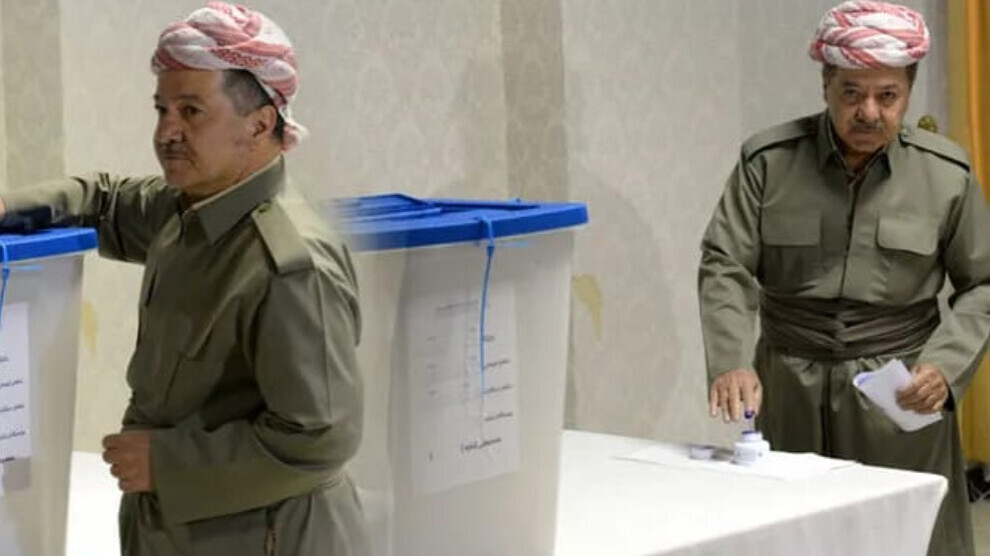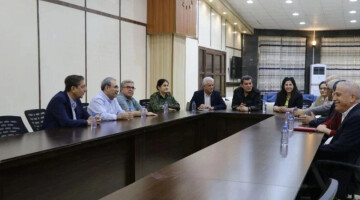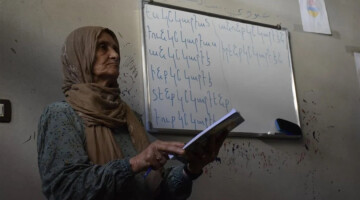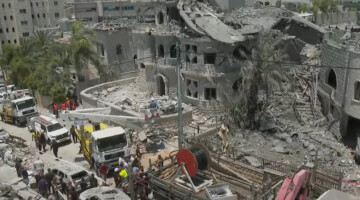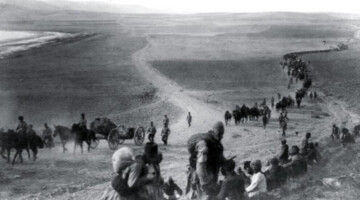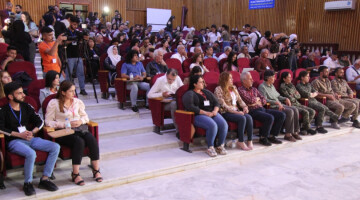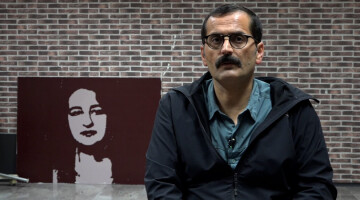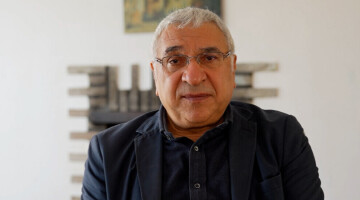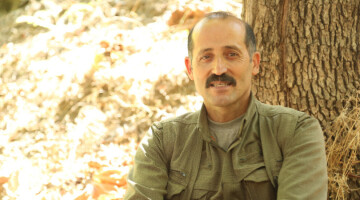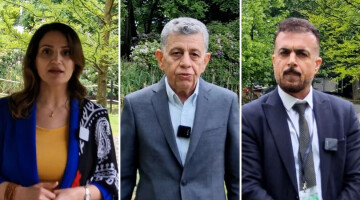In 1975, the majority of the Peshmerga force, which numbered more than 100 thousand, laid down their arms and went to Iran with the conviction of Mele Mistefa Barzani. This event, which took place after the Algiers Agreement between Iraq and Iran on 6 April of the same year, went down in the history of Southern Kurdistan as "Aşbetal/ Liquidation". Aşbetal means "stopping of the mill" among the people, while its political meaning was the withdrawal of the Kurds from the mountains with Mele Mistefa Barzani's declaration that "the revolution is over". With this, for the first time in the history of Kurdistan, a resistance and rebellion were liquidated by its own leader.
1970s...
While the events in Bashûr (Southern Kurdistan), which has paid a heavy price, are not limited to the beginning and end of this event, the period from 1961 to the 70s covers one of the most visible periods of war and struggle. As a result of Barzani's foreign-dependent policy, the struggle of the people of Bashûr suffered one of its first blows with the "Declaration of Peace" signed on 11 March 1970 with Saddam Hussein, then vice president of Iraq. While the main goal of the Ba'ath regime was to completely destroy the Kurdish struggle, Barzani's policies almost served this purpose.
MELE MISTEFA'S REMARKS TO KEYHAN NEWSPAPER IN TEHRAN
After declaring the end of the revolution in 1975, Mele Mistefa and his entourage would end up in Tehran. Barzani, in an interview he gave to Emîr Tahirî of Keyhan Newspaper in Iran on 10 May 1975, said "My job is done. I no longer have a role as the leader of the Iraqi Kurds. I was not aware of the Algiers Agreement. However, I support this agreement because it is an agreement for the benefit of the Iranian peoples. Anything that is in the interests of Iran is in the interests of the Kurds". The newspaper, on the other hand, would call Barzani's words "An important period of Iraq was closed forever" and would reveal how Aşbetal led Bashûr through a historical turning point.
QASİMLO, THE PROVISIONAL COMMITTEE AND THE BARZANIS
Dr Abdulrehman Qasimlo, one of the revolutionary leaders of Rojhilatê (Eastern) Kurdistan and leader of the Kurdistan Democratic Party of Iran, was also present on the stage of history at that time. Qasimlo sheds light on that period and the developments in his book titled "Ihaneta Qiyade Mueqete Bi Neteweî Kurd/ The Treachery of the Provisional Committee against the Kurdish People".
In his book, Qasimlo states that the people of Southern Kurdistan were happy that they were able to obtain some of their rights from the Iraqi state with the agreement signed on 11 March 1970, and notes that the Barzanis banned the actions of the people of Southern Kurdistan against Iran for a long period in order to 'protect their gains'. After the 11 March Declaration, Qasimlo wrote that he sat down with Mistefa Barzani and said, "This is a pleasing situation for us that the Kurdish question will be solved in Southern Kurdistan and most importantly, the Kurdish movement there will no longer need the Iranian state. After the 11 March Declaration, some leaders of our party went to Barzani. Barzani was asked not to prevent the KDP officials and peshmerga from travelling to Rojhilat from Bashûr to help the development of the forces of Rojhilat. Barzani said to our party leaders: "Under no circumstances should you travel to and from Iran and it is not right for you to be in the public eye in Bashûr. In particular, there should not be any headquarters of your Peshmerga forces on the border".
QASIIMLO: KDP WORKED TOGETHER WITH SAVAK
"There is now an autonomous administration here and we have Kurdish ministers. It is better for you to establish relations with Iraq and move to the cities under their control", Qasimlo cited Barzani as saying: "After Barzani's personal suggestion, we moved our work towards Iraqi cities. With the decree of the Shah of Iran, the organisations belonging to Barzani started a great black propaganda against us. They called our relations with Iraq 'they sold themselves'.
The Parastin formation of the KDP, together with SAVAK (Iranian intelligence), had placed its agents among the Rojhilat organisations in Bashûr. They called themselves the 'Provisional Democratic Committee'. I have documents showing that SAVAK sent them logistical support, especially ammunition, via Parastin. This organisation, which was established on paper, was working not only against us, but also against the other parts of Kurdistan, Bakûr and Rojava, in order to prevent the formation of a strong Kurdish party that had established its unity." His words provide some data about the historical development of today's KDP.
From those days until today, many phases of Kurdistan's struggle have fallen victim to this "political mind".
TODAY AND THE ELECTION AGENDA
Nowadays, the regional parliamentary elections are at the top of the agenda in the streets of Bashûr. The people of the region are closely following the KDP's 'mobilisation' to save its power. In this dizzying traffic, the KDP is insistently going to Washington, Ankara, Tehran and Baghdad to postpone the elections. One of the greatest characteristics of the people of Bashûr is that they have a very strong memory. The people of Bashûr, who have been familiar with the dynamics of the war since the 1950s in their own words, also express the reasons for the current dynamics with very strong interpretations. They know that all the efforts of the KDP to prevent the regional elections expected to be held on 10 June are the result of the 'leaning on the enemy' policy it has been pursuing in Kurdistan since the 1950s.
MAM JALAL: KDP WOULD WIN EVEN IN CHINA!
Experiencing the weakest period in its 80-year history, the KDP has been making a great effort to prevent the Southern Kurdistan Regional Parliamentary elections from taking place for a long time. Especially with the change in the electoral law, striking details about how the KDP has been the first party in the region since 1992, when the parliament was established, are coming to light.
The biggest fears of the KDP are that the Iraqi High Election Commission, which was assigned to organise the elections, revealed as a result of first research that there were approximately 400 thousand fake voters and that the 11 seats it obtained without elections under the name of a minority quota would be taken away. According to the law, approximately 30 thousand votes correspond to 1 seat, while 400 thousand fake voters correspond to approximately 13 seats. The fake voter lists consist of fake IDs and dead voters. While KDP's election frauds are not limited to this, Jalal Talabani, who realised this in time, summarises it with the historical saying "KDP would win even if it entered the elections in China."
WHAT MIGHT HAPPEN IF THE ELECTIONS TAKE PLACE?
If the KDP enters the elections under the specified conditions, it means that it will lose power in Southern Kurdistan after 30 years. While new political processes are expected to emerge in this situation, the KDP has not included this situation among its options. In the new period, the KDP is far away not only from being the second party, but even from reaching a position that can provide the same balance as the PUK (Patriotic Union of Kurdistan) if the elections take place. While the US is in favour of holding the elections, Turkey, which is against it, provides support to prevent it. While the attitude of Iran, one of the third important actors of the region, on this issue is also curious, Nechirvan Barzani's attempts to convince Iran about the postponement of the elections continue. While this is the main agenda in Barzani's bag on his way to Iran, it is also thought that Iran may utilise this situation to distance the KDP from the USA, Israel and Turkey.
KDP'S APPROACH BRINGS MORE OPENNESS TO FOREIGN INTERVENTIONS
In the event that the elections take place, and the result coincides with the predictions, the question of how the KDP, which took Hewlêr (Erbil) from the PUK with Saddam Hussein's tanks in 1996, will view the new government's ability to enter the parliament in Hewlêr is at the top of the voters' agenda. Even if such a result comes out, the KDP does not intend to legally hand over any institution, from the Internal Security Forces to parliament, from parliament to Asayish (Public Security). In this context, if the legal processes are not followed, the Iraqi Federal Police have the right to intervene in the region according to the law. This situation, on the other hand, offers a ground for forces such as the USA, Turkey and Iran to intervene in the region.
BARZANIS ARE ALSO COMPETING WITH EACH OTHER
While the attitude of the Barzanis and KDP members is gradually making Southern Kurdistan open to foreign interventions, the crisis in question is also causing contradictions and cracks within the family. While Nechirvan Barzani wants the elections to be held, KDP Prime Minister Masoud Barzani and regional prime minister Masrour Barzani favour postponement. The contradictions between the Barzanis go back to the suspicious death of Idris Barzani, the father of Nechirvan Barzani. While Nechirvan Barzani seems ready to sacrifice Masoud and Masrur Barzani in case of a change in the balance, he does not stay away from the policies that prepare the infrastructure for this. In the new possible political balances, PUK’s candidacies for the presidency of the Kurdistan Region and the prime ministry of the region disturb the KDP at the highest level, and in case one of the candidacies is realised, the concern of "What will happen to me?" is increasing among the aforementioned parties. Even though it is not put into words very much, the rivalry between the Barzanis can sometimes turn into an "invisible" politics.
THE MAIN CONCERN IS THE NON-OCCUPATION OF THE BASHUR TERRITORY
While the voters' comment that "If the KDP agrees to enter the elections, it must have a vested interest" is another striking detail about the KDP's negotiations, the main concern is that the remaining 49 percent of Bashûr lands should not be lost as a result of the "policy of offering". As a matter of fact, the loss of 51 percent of the territory of Southern Kurdistan to Hashd al-Shaabi and the Iraqi army after the referendum held in 2017 as a result of similar insistence is a memorable experience.
NEGOTIATIONS CONTINUE
While the KDP's actions are preparing the environment for deepening a civil war with other Kurdish parties, especially with the PUK, the negotiations over the region continue. While the parties are sending messages to each other through local actors in a place where proxy wars are going on, Barzani is in Tehran, and PUK President Bafil Talabani is holding talks in Washington. Although it seems distant, the possibility of an agreement with the PUK and the possibility of postponing the elections in return for some concessions are also among the discussions. While the instability in question is expected to continue in the near future, the bill for these processes is borne by the people.

